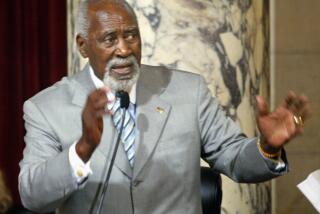Many in Military Continue to View President Warily
- Share via
WHITEMAN AIR FORCE BASE, Mo. — President Clinton, who has never quite shed the label of draft dodger among many of the troops he commands, on Friday climbed into the snug cockpit of the nation’s most ferocious warplane, the B-2 Stealth bomber. He liked it so much he spent 10 minutes there.
The president also basked in the cheers of crews that have dispatched B-2s to Yugoslavia, worked a line of military personnel and families, and cooed over their babies.
Still, for all the evidence of camaraderie between the commander in chief and his GIs, there remains an undercurrent of doubt about Clinton among military figures.
There has been success in the Balkans, a pay-raise proposal for the troops and a turnaround in declining Pentagon budget requests. But 6 1/2 years after he took office, to some warriors and civilian allies he is still the baby-boomer-Yale-and-Oxford president who generated controversy over gays in the military and whose initial staff included senior aides openly scornful of the armed services.
The picture of Clinton and the military is complicated, more gray than black and white.
Whiteman Air Force Base, about 75 miles southeast of Kansas City, is home to the 509th Bomb Wing. Clinton found a friendly and appreciative, though not emotional and gushing, crowd of about 2,000 flag-waving airmen, officers and families.
At the base, Clinton saluted the Air Force personnel “for a job well done” in the Yugoslav campaign.
Thanks in part to their work, he said, Yugoslav President Slobodan Milosevic agreed to a plan allowing refugees to return to Kosovo province with security and self-government. Serbian forces are on their way out of Kosovo, and an international security force is on its way in.
“Mr. Milosevic accepted these conditions for one reason--you made him do it,” the president told the applauding troops. “He ran out of room, and he ran out of time.”
The reception here reflects what military and civilian observers--many themselves skeptical of Clinton at the beginning--portray as a maturing and learning process.
It has worked both ways: Clinton has learned about the role of the military in conducting foreign policy, and the military has learned to accept his leadership.
On the one hand, military personnel appreciate his readiness to listen to the generals, and to salute the troops each Memorial Day and Veterans Day at Arlington National Cemetery, as well as the financial commitments he has made. On the other, they complain about the crushing pressures that increased operations have put on airmen and sailors, Marines and soldiers, and question whether he yet knows the best ways to use military force.
“I’m glad he’s strengthened the military somewhat,” Sgt. 1st Class Gary Courtney of the Air National Guard said as he waited for Clinton in a sweltering hangar with his 7-year-old son and 4-year-old daughter. “The benefits are better than five, six years ago.”
But one participant in national security policymaking over the past 20 years questioned whether the president’s maturation has made a significant dent in the skeptical view many officers still hold of him.
“There is too much already--not just the scandals, but the wars with the Congress” over military spending--that convinces them that Clinton might not thoroughly understand their mission and their sacrifice, he said.
Many in the senior leadership believe that air power in the Balkan war should have been applied more quickly and forcefully to change the Serbs’ minds and halt the “ethnic cleansing” of Kosovo Albanians, one senior Air Force officer said.
“There isn’t a great deal of respect for the leadership,” the officer said.
While the administration complained about how the North Atlantic Treaty Organization, with 18 other members, tied America’s hands, many uniformed leaders believe that the U.S. can sway the others if it uses its influence, the officer said.
But the larger concern, the officer said, is the way the administration’s many deployments around the world have stretched U.S. forces thin, straining family lives and driving many personnel from the services.
The number of men and women wearing the uniforms of the Pentagon’s four branches has dropped 40% since the end of the Cold War, said retired Army Col. Doug Coffey, while the number of missions they have conducted has increased 300%. And a budget that topped $265 billion 14 years ago is just now reaching that level again.
Richard J. Dunn, a recently retired Army colonel, said he believes that the anti-Clinton feelings that predominated early in the president’s first term “have pretty much run their course.”
Although he said he is “not a Clinton fan,” Dunn said he believes the military appreciates that Clinton has generally “heeded its advice and been pretty supportive.”
Dunn, who was an Army engineer in Vietnam, said he thinks that Clinton has shown proper interest in the troops in touring bases and that the forces have found him charming, even “charismatic.”
“I think he’s done OK by the military,” he said.
*
Gerstenzang reported from Washington and Chen from Whiteman. Times staff writer Paul Richter in Washington also contributed to this report.
More to Read
Sign up for Essential California
The most important California stories and recommendations in your inbox every morning.
You may occasionally receive promotional content from the Los Angeles Times.













